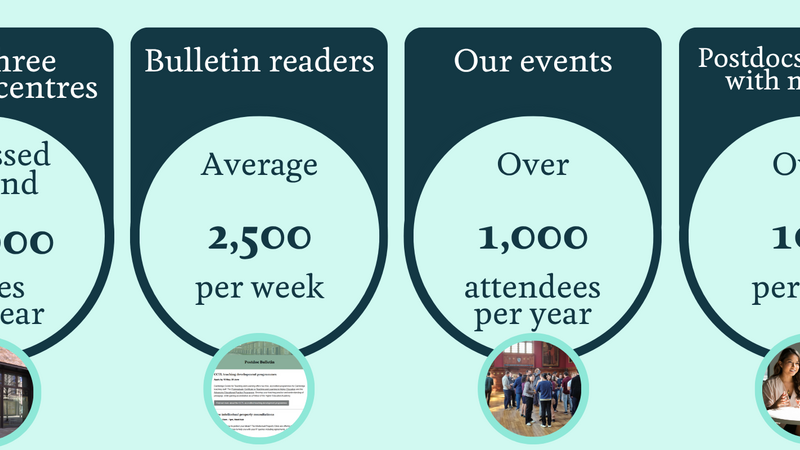Our Impact
The Postdoc Academy provides three Postdoc Centres across Cambridge, which are accessed roughly 10,000 times per year with postdocs attending/hosting events and using the hot-desking spaces.
We support over 1,000 postdocs per year through our professional development, information and community events.
We individually match over 100 postdocs per year with a mentor through our developmental mentoring programme.
We reach on average 2,500 postdocs every week with our bulletin of upcoming events and opportunities.
The Postdoc Academy contributes to the development of University policy affecting postdocs through a wide variety of committees and working groups. In recent years, these have included: researcher reward and recognition, review of fixed-term contracts, inclusive recruitment, EDI, and research culture. Beyond Cambridge, members of our team have also helped to found the Researchers14 Network, the European Postdocs to Innovators (p2i) Network, and the UKRI-funded Future Leaders Fellows Development Network.
We have also worked to expand and promote opportunities for postdocs themselves to serve on University committees and working groups.

Reports
In 2021 we produced a report on the first seven years of the Postdoc Academy (formerly Office of Postdoctoral Affairs). Reflecting on the activities, programmes and spaces that had been created in support of the postdoc community since the first Postdoc Centre opened its doors in 2014.
Read more about the impact of our early years in our 2021 report.
Fellowships
The Postdoc Academy has hosted two unique fellowships for some of Cambridge’s most outstanding researchers as they reached the pivotal career transition to independence - The Borysiewicz Interdisciplinary Fellowship and the Canada-UK Postdoctoral Fellowship for Innovation and Entrepreneurship. The Borysiewicz Fellowship was created in honour of Sir Leszek Borysiewicz who, as Vice-Chancellor of the University, led and shaped the development of key provisions for Cambridge’s postdoc community.
These schemes provided tailored, holistic support and development opportunities, which enhanced not only the interdisciplinary training of the Fellows but also their capacity to build creative solutions to global challenges. The Fellowships culminated in a chance to pursue truly independent work in a funded project of their own.
The Fellows acquired the confidence to apply their skills to complex challenges across the research, innovation, and policy fields as they took their next steps towards career independence.
Although not currently running as fellowship schemes, we have incorporated successful elements of the training programmes into our broader professional development offering.
